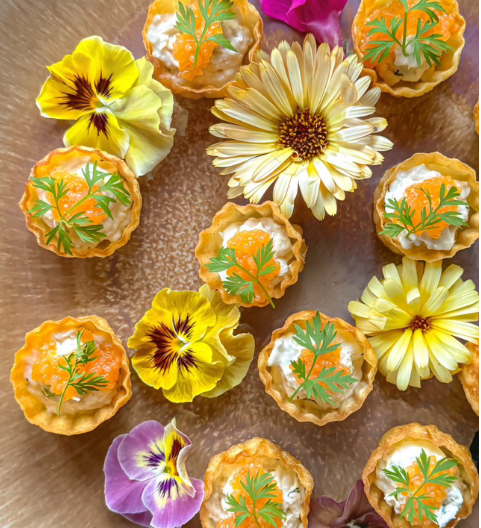
Do you think flowers are only for the vase? Think twice!
Edible flowers have been a staple in cuisine for centuries, providing bold colors, subtle flavors, and impressive nutritional benefits to the plate. From Roman banquets to contemporary haute cuisine, these flowers have been a welcome guest at the table.
As more turn to plant-based eating, they're looking for new, natural, and nutrition-packed ingredients—and edible flowers are once again gaining popularity. They not only dress up the look of a meal but add antioxidants, vitamins, and intriguing textures to your cuisine.
At Planted Detroit, we produce a range of fresh, pesticide-free edible flowers in our indoor vertical farm so that they can be at the peak of freshness and quality. From garnishing a salad to adding color to a dessert or flavor to a drink, these small blossoms are filled with possibilities.
Here in our blog, we'll explore what edible flowers are, their benefits, and how to incorporate them into your daily meals.
What Are Edible Flowers?
Edible flowers take from their name— they are flowers that can be safely consumed and utilized to add flavor, texture, and nutritional value to dishes. From Japanese cherry blossoms in tea to Italian zucchini flowers in fritters, edible flowers have been a kitchen staple around the globe.
At Planted Detroit, we nurture a variety of colorful, nutrient-dense edible flowers, such as:
Viola: delicately sweet with a grassy note, ideal for desserts and salads.
Snapdragon: fresh and faintly bitter, bringing a gentle richness to meat dishes.
Dianthus: clove-scented and floral, ideal for adding a subtle spice to tea and cakes.
Calendula: otherwise called "poor man's saffron," with a peppery, tangy taste.
Bachelor Button: a delicate, cucumber flavor that pairs well with cocktails and salads.
Begonia: tart and citrusy, ideal for fruit arrangements and seafood.
They are cultivated sustainably in our Detroit vertical farm, making them pesticide-free, and picked at the peak of freshness. Not all flowers are edible, so it is important to buy from reputable growers like Planted Detroit instead of taking flowers from an unknown source.
Interested in learning more? Browse our edible flower collection and see how these flowers can spice up your meals!
Nutritional Benefits of Edible Flowers in a Plant-Based Diet
Edible flowers aren't merely about presenting your plate as Instagram-perfect—they're full of necessary nutrients, antioxidants, and health benefits that make them a nutritional powerhouse in any plant-based diet.
Rich in Antioxidants
Most edible flowers are rich in antioxidants, which prevent inflammation, fight oxidative stress, and promote overall immune function. Viola and Calendula flowers are rich in flavonoids and carotenoids, which prevent cell damage and maintain healthy skin.
Packed with Vitamins & Minerals

Some edible flowers are surprisingly full of vitamins and minerals:
Begonia: rich in Vitamin C, excellent for immunity and skin.
Calendula: rich in beta-carotene (Vitamin A), beneficial for eye care.
Dianthus: a great iron content, necessary for oxygen transportation in the bloodstream.
Gut-Friendly & Low-Calorie
Several edible flowers have been utilized in conventional medicine to promote digestion and intestinal health. Calendula, for instance, contains anti-inflammatory compounds that can facilitate digestion. And they're low-calorie but high-nutrient, making them an ideal addition to salads, teas, smoothies, and desserts.
Curious to learn more about the science-backed health benefits of edible flowers? Read this expert article on their nutritional properties!
How Edible Flowers Elevate Plant-Based Cooking
Plant-based food is all about bright colors, fresh flavors, and innovative textures—and edible flowers fit the bill. Whether you want to pop a splash of color into your smoothie bowl or add depth to a simple salad, these flowers add another level to your meal.
Aesthetic Appeal & Natural Beauty
Let's get real—pretty food tastes better. Edible flowers add a splash of color, lacy petals, and an air of sophistication to any meal. They're the ultimate food styling hack from Mother Nature!
Flavor Profiles of Edible Flowers
Every edible flower has a distinctive flavor:
Viola: delicate and subtly sweet, ideal for dessert.
Snapdragon: slightly bitter, providing depth to salads.
Dianthus: spicy clove flavor, perfect in tea or baked items.
Calendula: peppery and pungent, ideal for savory meals.
Bachelor Button: grass-like and mild, perfect for herbal teas.
Begonia: citrus-flavored and tart, a zesty touch for fruits.
Using Edible Flowers in Vegan Cuisine
Salads: Top with fresh petals for color and taste.
Teas & Infusions: Steep Viola or Calendula for a floral tea.
Desserts: Top cakes and pastries with Snapdragon or Begonia.
Smoothie Bowls: Top with a few petals for a beautiful finish.
Curious about where your flowers are grown? Visit Planted Detroit's farm and learn how we guarantee freshness in every bloom!
Sustainability and the Farm-to-Table Movement
Picking locally grown edible flowers isn't only a delight for your palate—it's also a victory for the environment. At Planted Detroit, sustainability is what drives everything we do.
Vertical Farming: A Greener Future
We cultivate all our edible flowers with sustainable vertical farming methods, which translate to:
-
95% reduced water consumption compared to conventional farming.
-
No toxic pesticides or chemical fertilizers.
-
Year-round cultivation guarantees freshness throughout the seasons.
Combating Food Waste through Edible Flowers
Edible flowers contribute to the zero-waste cause through the utilization of plant parts that could be otherwise wasted. Rather than have flowers go to waste, they get transformed into delicious, healthy ingredients in food—avoiding food waste while adding flavor to dishes.
Easy Ways to Use Edible Flowers in Everyday Meals

It takes no Michelin-starred chef to add edible flowers to your dishes. These flowers are a simple (and gorgeous) means of adding flavor, nutritional value, and presentation. Here are some easy ways to incorporate them into your everyday plant-based meals:
Toss Them in Salads: A few handfuls of Violas, Calendulas, or Begonias can brighten up a green salad into an upscale meal. Their colors and light flavors inject a burst of fresh, in-season flavor.
Garnish smoothie bowls & grain bowls: Top oatmeal, smoothie bowls, or quinoa dishes with edible flowers for a pop of color and an Instagram-fan-worthy appearance.
Make Herbal Teas & Infusions: Dianthus and Calendula flowers are great additions to tea. Just steep them in hot water for a scented, antioxidant drink.
Bake Them into Treats: Press Snapdragons or Violas onto cupcakes, cookies, or cakes and bake for a fresh, edible garnish.
Freeze into Ice Cubes: Take your beverages to the next level by freezing Begonias or Bachelor Buttons into ice cubes. They create a stunning look in cocktails, infused water, or lemonades.
Interested in more recipes with edible flowers? Read our plant-based recipe blog for inspiration!
Where to Find Fresh, High-Quality Edible Flowers
Not all flowers are edible—garden flowers and grocery store bouquets are usually sprayed with pesticides and chemicals that are not safe for eating. If you need fresh, food-grade edible flowers, the way to get them is from a reputable farm.
Why choose locally grown edible flowers?
-
No pesticides or toxic chemicals
-
Grown exclusively for cooking
-
Fresh, flavorful, and sustainably picked
At Planted Detroit, we provide premium, locally cultivated edible flower mixes, plucked fresh from our indoor vertical farm. Our flowers are cultivated without the use of pesticides and shipped in optimal freshness, so you can feel good about adding them to your recipes.
You can order our edible flower bunches simply through Market Wagon, a virtual farmers market connecting you with fresh, local items—including our tasty edible flowers!
Edible flowers are not merely a cosmetic garnish—both colorful and nutritious, they add flavor and nutrient-dense value to vegetarian meals. With their antioxidant powers and capacity to transform plain fare into breathtaking creations, these flowers are a home cook's best friend.
We grow fresh, pesticide-free, sustainable edible flowers at Planted Detroit that can be used for salads, teas, desserts, and beyond.
Ready to incorporate edible flowers into your cuisine? Buy our fresh flower blends today and introduce elegance and nourishment to your plate!
